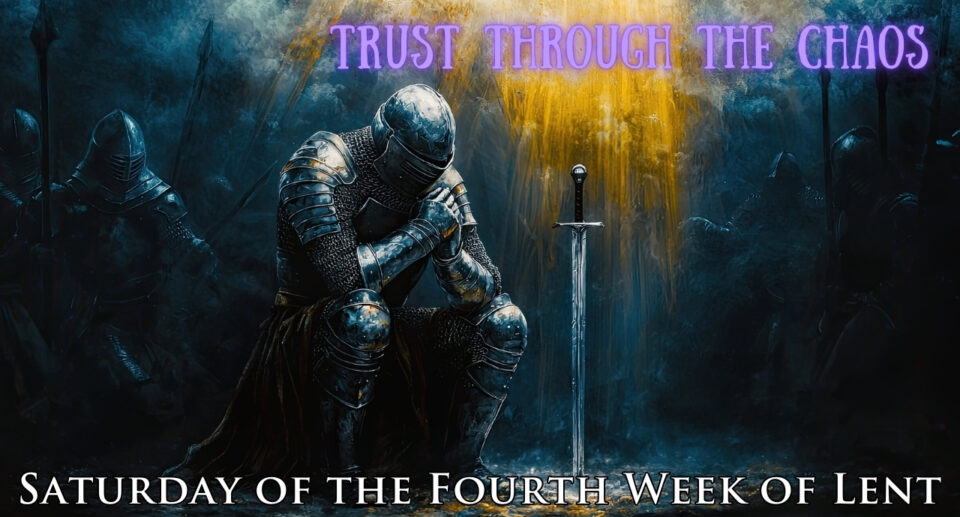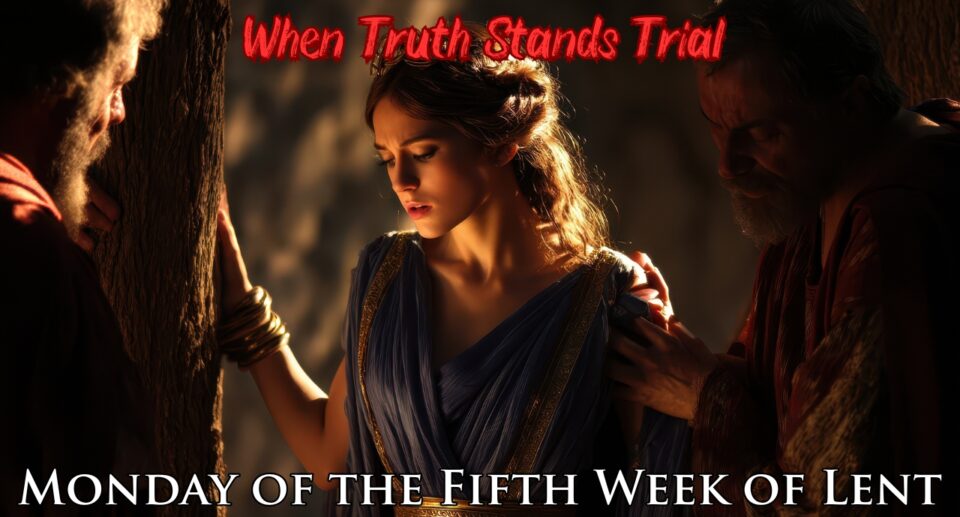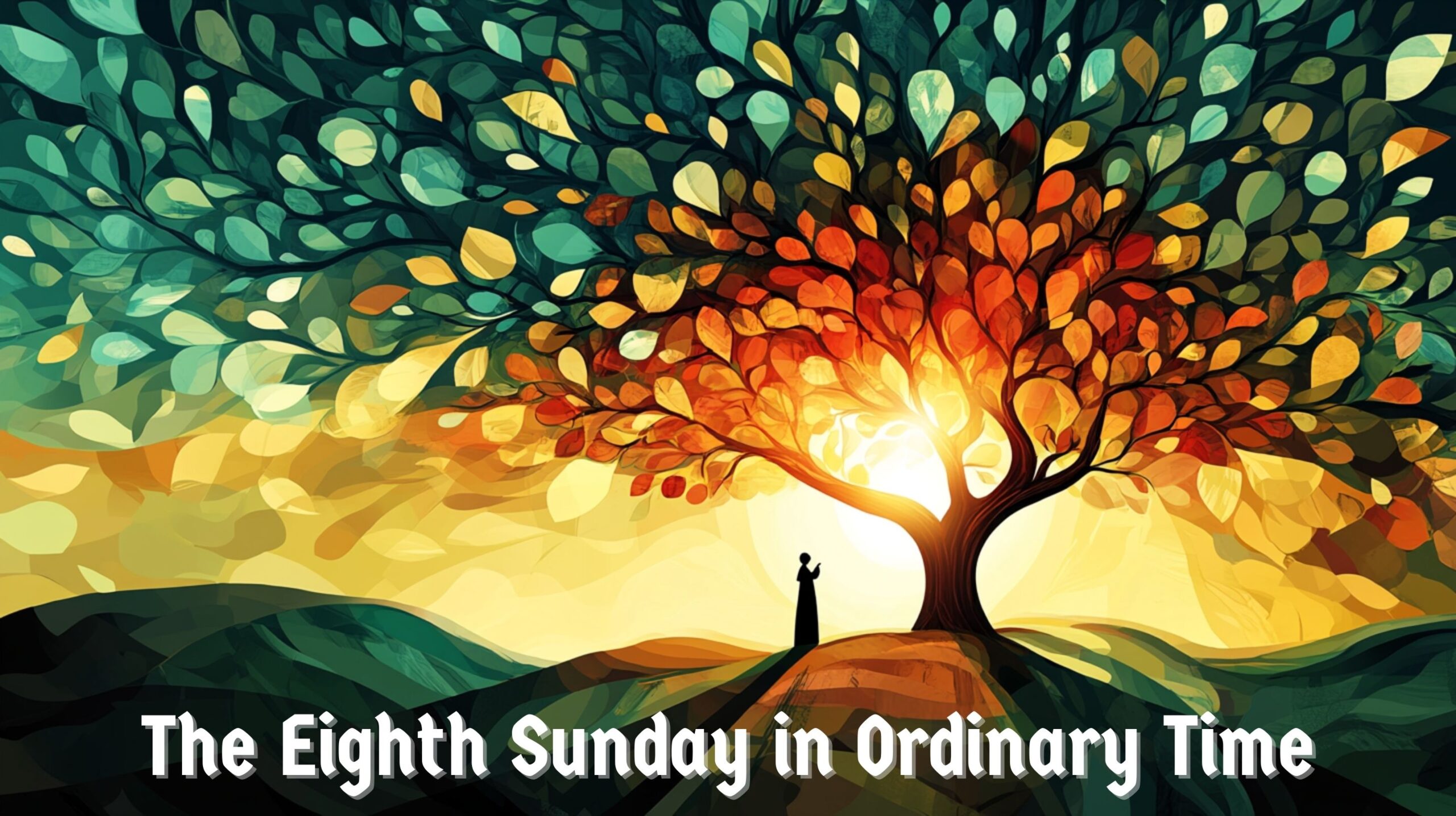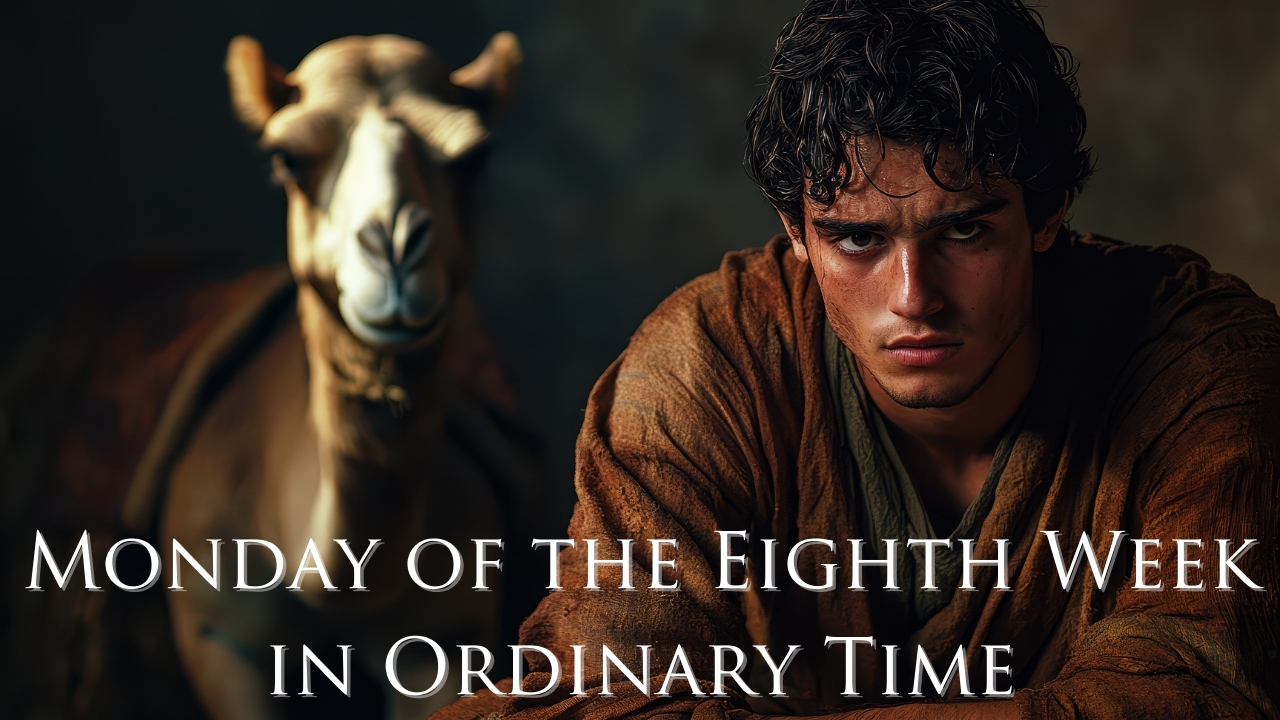From Condemnation to Freedom: Her Story of Mercy | Daily Readings | April 6, 2025
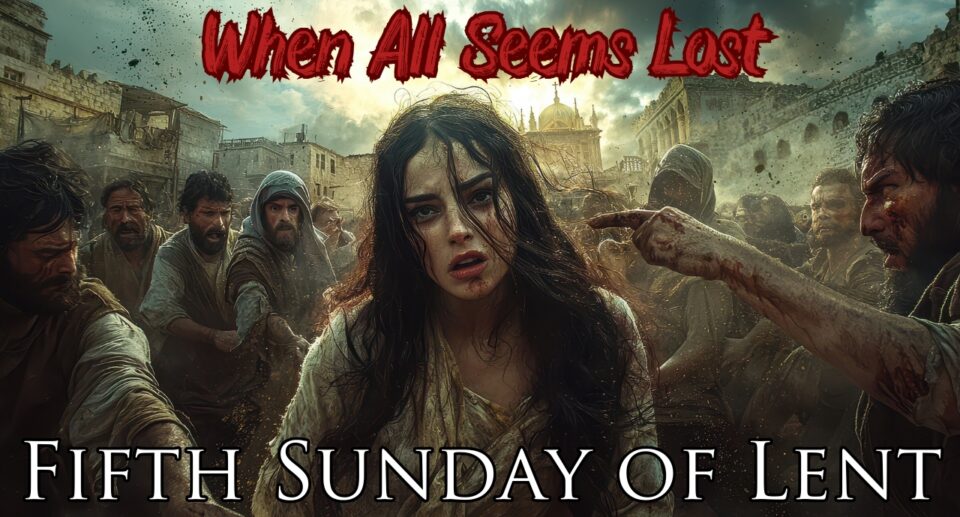
Experience the dramatic power of God’s transformation in this Fifth Sunday of Lent reflection. Journey from Isaiah’s desert rivers to Paul’s radical reordering of values to Jesus’s defense of the woman caught in adultery—and discover how God creates new beginnings when all paths seem closed.
What you’ll discover in this reflection:
- How God transforms impossible situations into pathways of hope
- The paradoxical truth of sowing in tears to reap in joy
- Freedom from being defined by your past mistakes
- The perfect balance of mercy and truth in Jesus’s approach to sin
Readings covered: Isaiah 43:16-21, Psalm 126:1-6, Philippians 3:8-14, John 8:1-11
Perfect for anyone navigating difficult transitions, seeking freedom from past mistakes, or preparing their heart for Holy Week.
“See, I am doing something new! Now it springs forth, do you not perceive it?” – Isaiah 43:19
#FifthSundayOfLent #RiversInTheDesert #TransformationInChrist #GodBreaksThrough #HolyWeekPreparation #DailyReadings #CatholicLent #ChristianReflection
Rivers in the Desert: Finding New Beginnings When All Seems Lost
The accusers circle like vultures. Their faces contort with righteous indignation as they drag her into the temple courtyard. Dust clouds rise with each forceful step. The woman’s hair hangs over her face—a small mercy that hides her shame from the growing crowd.
“Teacher, this woman was caught in the very act of committing adultery.”
The words hang in the air, sharp as the stones clutched in their hands. The trap is set. Every eye turns to Jesus.
Have you ever felt exposed? Caught? Dragged into the light with nowhere to hide? Or perhaps you’ve stood among the accusers, stone in hand, certain of your righteousness and another’s guilt?
Today’s Gospel places us squarely within this ancient scene that feels disturbingly contemporary. But to understand its full significance, we need to journey through all of today’s readings, which together tell a revolutionary story about how God creates new beginnings where humans see only dead ends.
In our first reading from Isaiah, we hear God speak to a people in exile—a community that had lost everything. Their temple destroyed, their land conquered, their identity in tatters. They cling to memories of God’s past deliverance, particularly the Exodus when God parted the Red Sea to save them from Pharaoh’s army.
But then God says something startling: “Remember not the events of the past, the things of long ago consider not; see, I am doing something new!”
Imagine telling a people defined by their history to forget it. It would be like telling Americans to forget the Revolution, or telling Christians to forget the Resurrection. Yet God isn’t dismissing history—God is breaking its tyrannical hold on the imagination.
“In the desert I make a way,” God declares, “in the wasteland, rivers.”
This is no small promise. In the ancient Near East, the desert represented everything hostile to life—heat, thirst, disorientation, death. To create rivers in such a place isn’t just unlikely; it’s a complete reversal of the natural order. God is promising to transform the very landscape of impossibility.
These weren’t empty words. Within a generation, the exiles would indeed return to Jerusalem. The wasteland of their despair would bloom with the rivers of restoration.
Our Responsorial Psalm captures this exact experience: “When the LORD brought back the captives of Zion, we were like men dreaming. Then our mouth was filled with laughter, and our tongue with rejoicing.”
Can you recall a moment when joy seemed so unexpected, so overwhelming that it felt like a dream? The psalm describes that precise sensation—the disorienting experience of receiving what you’ve given up hoping for.
But the psalm doesn’t stop with this memory. It pushes further, into the mysterious paradox at the heart of spiritual transformation: “Those who sow in tears shall reap rejoicing.”
This isn’t just poetic language. This is agricultural wisdom transformed into spiritual truth. The farmer who plants knows that seed must be buried—must seemingly die—before new life emerges. The tears of planting precede the joy of harvest.
What seeds are you planting in tears right now? What difficult beginnings might God be using to create an unexpected harvest?
In our reading from Philippians, Paul demonstrates this principle in his own life. This man who once defined himself by his religious credentials—”circumcised on the eighth day, of the people of Israel, of the tribe of Benjamin, a Hebrew of Hebrews”—now considers it all “rubbish” compared to knowing Christ.
Paul’s language here is jarring. The Greek word skubala that we translate as “rubbish” is actually cruder than that—more like “dung” or “garbage.” Paul is saying that everything he once built his identity upon is worthless compared to his relationship with Christ.
This isn’t false humility. This is a man who has discovered a value system so superior that his former prizes look like trash in comparison. And he’s still in process: “It is not that I have already taken hold of it or have already attained perfect maturity, but I continue my pursuit in hope that I may possess it.”
Like a runner with eyes fixed on the finish line, Paul “strains forward to what lies ahead.” He refuses to be defined by either his past achievements or failures. The only direction that matters is forward, toward Christ.
Which brings us back to the temple courtyard, where a woman’s fate hangs in the balance.
The scribes and Pharisees who bring this woman to Jesus aren’t primarily concerned with her sin. John tells us explicitly that “they said this to test him.” They want to trap Jesus between the law of Moses, which prescribed stoning for adultery, and Roman law, which forbade Jews from executing capital punishment.
It’s worth noting the gendered injustice here too. Adultery takes two, yet only the woman stands accused. Where is the man? The law required both parties to be stoned, yet he is conspicuously absent from this public shaming.
Jesus’s response is captivating in its simplicity. He bends down and writes in the dust. What words or symbols did his finger trace in the dirt of the temple floor? Scripture doesn’t tell us, leaving centuries of readers to wonder. Was he listing the accusers’ sins? Writing the names of their mistresses? Or perhaps transcribing Jeremiah 17:13—”Those who turn away from you shall be written in the earth”?
When he finally straightens up, Jesus delivers one of the most memorable lines in all of Scripture: “Let the one among you who is without sin be the first to throw a stone at her.”
One by one, they drift away, “beginning with the elders.” Those with the most life experience are the first to recognize their own sinfulness. Finally, Jesus is alone with the woman.
“Woman, where are they? Has no one condemned you?” “No one, sir.” “Neither do I condemn you. Go, and from now on do not sin anymore.”
In these few words, Jesus demonstrates the perfect balance of mercy and truth. He doesn’t condemn her, yet he doesn’t condone her sin either. Instead, he creates space for something new—a life no longer defined by her past failures, but by the possibility of walking a different path.
Do you see how today’s readings fit together? Isaiah promises rivers in the desert—a complete reversal of natural expectations. The psalm describes the dreamlike joy of experiencing God’s restoration and the paradox of sowing in tears to reap in joy. Paul demonstrates what it looks like to press forward rather than being defined by the past. And in the Gospel, Jesus creates a new beginning for a woman caught in the act of sin.
The thread that binds these readings is transformation—God’s incredible power to create new possibilities where humans see only dead ends. The God who makes rivers in the desert is the same God who transforms Paul’s value system and offers the adulterous woman a future not determined by her past.
This is not abstract theology. This is the beating heart of the Christian faith—that no matter what wasteland we find ourselves in, God can make a way through it. No matter what sins have defined us, God can create a new identity. No matter what accusers circle around us, God can disperse them with the power of truth.
As we stand just one week away from Palm Sunday, these readings prepare us for the ultimate transformation that Holy Week commemorates—death itself transformed into the gateway to eternal life.
In our own lives, this Fifth Sunday of Lent invites us to locate the deserts that seem impassable, the tears we’re sowing that feel futile, the past that still defines us, the guilt that still condemns us—and to open these spaces to God’s transforming power.
Where in your life do you need rivers in the desert? Where do you need to strain forward to what lies ahead rather than looking back? Where do you need to hear those liberating words, “Neither do I condemn you”?
Perhaps you’re navigating the desert of a broken relationship, wondering if reconciliation is possible. Perhaps you’re planting seeds of effort in a new career or ministry that has yet to bear fruit. Perhaps, like Paul, you’re in the process of reordering your values, letting go of what once seemed important to make room for deeper priorities. Or perhaps, like the woman in the Gospel, you’re haunted by past failures, standing exposed before accusers both external and internal.
Wherever you find yourself today, these readings assure you that God specializes in creating new beginnings. The same God who opened paths through the sea, who brought laughter to the exiles, who gave Paul a new identity, who dispersed the woman’s accusers—this God walks with you now, whispering, “See, I am doing something new! Now it springs forth, do you not perceive it?”
As we move toward Holy Week, may we open our eyes to perceive the new things God is doing in our desert places. May we plant our tears with hope, knowing that joy will come in the harvest. May we strain forward toward what lies ahead rather than being held captive by what lies behind. And may we experience the liberating truth that in Christ, condemnation gives way to new beginnings.
Rivers in the desert. Joy after tears. Forward movement. Freedom from condemnation. These are God’s promises to us this Fifth Sunday of Lent. Let us receive them with open hearts.

